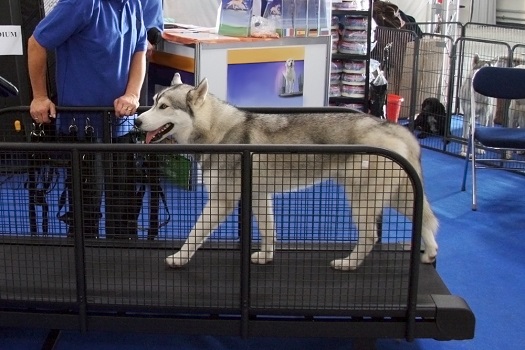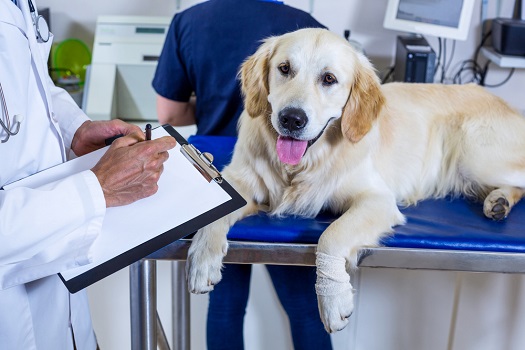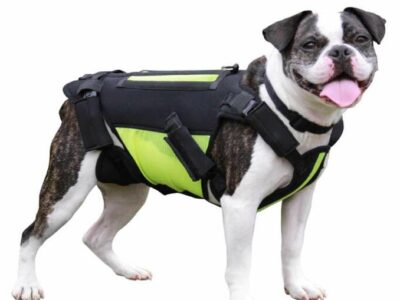
Table of Contents[Hide][Show]
Have you thought about taking your dog to an integrative veterinarian? It’s a great option for animals with chronic health problems.
Recently, I made this recommendation to a pet owner who asked for help in finding a canine physical therapist near her home. Her dog had just become paralyzed due to a ruptured disc in his spine. The dog’s vet wanted her to enroll the pup into rehab.
During my search, I discovered her home town wasn’t close to any canine rehabilitation center. In fact, the town was more than 100 miles away, in every direction, from any kind of rehab specialist.
The woman’s question is one I get asked often. Pet owners know there are resources and experts who can treat their pet’s condition, but then find out they aren’t available in their area.
My answer is to find an integrative veterinarian. It’s a specialty that’s growing around the country and becoming popular because it blends mainstream medicine with holistic and rehabilitative care.
Note: This post contains affiliate links. Read our policy.

Ask & Discover
Get personalized content recommendations and answers drawn from our website. Simply type your question or topic of interest, and our AI assistant will help you find relevant articles, tips, and insights. You can also have a natural conversation to explore topics in more depth.
How integrative veterinary medicine works
Integrative veterinarians are trained in Western medicine and have additional education in complementary treatments, like acupuncture, nutrition and other types of holistic care. Many are trained in canine rehabilitation and physical therapy as well.
Their comprehensive approach for treatment means they have a broad base of knowledge and services that can be offered under one roof.
The College of Integrative Veterinary Therapies calls integrative care, “The bridge where cutting edge science meets tradition.”
Western medicine vs. Holistic care

Western medicine is defined as being based on scientific evidence. It relies on diagnostic tests to determine why a specific part of the body is having a problem. Then it treats the condition with medicine and surgery.
Holistic healing looks at what’s happening to whole body of an animal. It also examines outside influences like the environment, stress levels, genetics and more. The goal of a practitioner is to find patterns that point to a disease and provide natural treatments to heal it.
Each philosophy has benefits. Traditional Western medicine excels in handling emergencies and acute illnesses. It’s works best when immediate results are needed. Holistic care incorporates therapies that take time and patience to see the final outcome.
Integrative medicine uses the best techniques from both conventional veterinary care and alternative medicine.
Sophie’s story

When my dog Sophie started to show signs of paralysis in her hind legs, I traveled all over town, dividing my time between our regular vet and a holistic practitioner I trusted.
The primary veterinarian took care of Sophie’s medical workup so we could rule out certain neurologic diseases. The holistic vet treated her with acupuncture, chiropractic adjustments and Chinese herbs.
There were a lot of balls in the air and a lot of stress. It was up to me to schedule multiple appointments each week and report test results back and forth to each vet.
Life could’ve been easier if we had turned to an integrative veterinarian. All of the treatments could’ve been done in one clinic that coordinated all of my dog’s care.
Holistic remedies integrative veterinarians use
Here’s a list of the common holistic treatments used in integrative healing:
Physical rehabilitation / physical therapy
Chiropractic adjustments
Acupuncture/ acupressure
Chinese herbal medicine
Diet and nutrition
Nutritional supplements
Reiki – A Japanese form of hands-on healing through touch and energy
Essential oils
Medical problems treated by an integrative veterinarian
While integrative vets are available to treat all ailments with Western medicine, these are the most common conditions where they blend techniques:
Arthritis
Diseases and injuries of the spine
Pain management
Gastro-intestinal diseases
Allergies
Diseases of the immune system
Skin conditions
Kidney disease
Heart disease
Liver Disease
Aging

Get the Essential Guide
The Essential Guide of Products for Handicapped Dogs e-book is a labor of love for me. I wrote it to answer your most pressing questions about where to find the best products for your wheelchair dog. You’ll find products you didn’t know existed and each will improve your dog’s quality of life. Print a copy and keep it by your side.
Treating a car sick puppy

When Bailey was a young puppy, she repeatedly got sick to her stomach every time she went for a ride in the car.
It didn’t matter if the windows were open to let her breathe the fresh air, if she went for a long or short ride or if food was withheld. During every car ride, she would empty her stomach.
At first the veterinarian prescribed an anti-nausea medication. It had to be given 30 minutes before Bailey got into the car. The medicine stopped Bailey from getting sick, but the side effects weren’t acceptable. The pill made Bailey so sleepy, she missed out on the enjoyment of the ride and the activity she was supposed to do when she arrived at her destination. Poor Bailey slept through puppy training classes and playdates with other dogs.
The vet realized the Western approach wasn’t going to solve the problem so he put together a blend of essential oils. A small drop was rubbed into Bailey’s belly and across her spine, 15 minutes before she got into the car.
That first day she used the essential oils, Bailey had a successful car ride. She wasn’t nauseous or sleepy. She continued to use the blend of oils until she outgrew her carsickness.
What it takes to become an integrative practitioner
Veterinarians who want to enter the field, must complete a post graduate course by an accredited college. UC Davis, Louisiana State University and Ohio State University Schools of Veterinary Medicine all offer courses in integrative veterinary medicine.
The opportunity to study integrative medicine has made it more common for veterinary practices to incorporate natural therapies. Today, lots of clinics and hospitals routinely offer treatments like acupuncture, chiropractic adjustments and basic physical therapy, alongside conventional medicine.
How to locate a vet
If you want to see if there’s an integrative vet in your area, the American Holistic Veterinary Medical Association has a national directory. They offer two national directories: one for Integrative vets and a second for Holistic veterinarians.
Want to read more?
9 Dog Physical Therapy Exercises You Can Do At Home
A Beautiful Mind: My Conversation with A Veterinary Neurologist




Leave a Reply